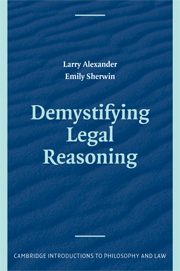Introduction
Published online by Cambridge University Press: 05 June 2012
Summary
Legal reasoning, meaning reasoning about the requirements and application of law, has been studied for centuries. This is not surprising: legal decision making is tremendously important to peace, prosperity, human dignity, and daily life. Yet, at least since Sir Edward Coke described the common law as “an artificial perfection of reason,” legal reasoning has been surrounded by an air of mystery. More recent works on legal reasoning have produced neither clarity nor consensus on what legal deliberation entails; if anything, they have compounded the problem. Legal decision making is frequently described as a “craft” involving special forms of reasoning that are accessible only to those with long experience in applying law. Seasoned judges and lawyers are said to reason analogically from one case to another and to discover or construct “legal principles” that differ from the moral principles that govern decision making in other areas of life.
Our own contribution to the subject of legal reasoning is fairly simple: we believe that legal reasoning is ordinary reasoning applied to legal problems. Legal decision makers engage in open-ended moral reasoning, empirical reasoning, and deduction from authoritative rules. These are the same modes of reasoning that all actors use in deciding what to do. Popular descriptions of additional forms of reasoning special to law are, in our view, simply false. Past results cannot determine the outcomes of new disputes. Analogical reasoning, as such, is not possible. Legal principles are both logically incoherent and normatively unattractive.
- Type
- Chapter
- Information
- Demystifying Legal Reasoning , pp. 1 - 6Publisher: Cambridge University PressPrint publication year: 2008

